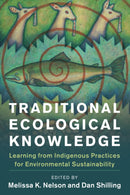Description
This book is edited by Melissa K. Nelson and Daniel Shilling. Melissa K. Nelson is Anishinaabe/Métis/Norwegian, and a member of the Turtle Mountain Band of Chippewa Indians, an ecologist and Indigenous scholar-activist. She is the editor of Original Instructions: Indigenous Teachings for a Sustainable Future (2008) and is an active media-maker, having produced several documentary short films.
This book examines the importance of Traditional Ecological Knowledge (TEK) and how it can provide models for a time-tested form of sustainability needed in the world today. The essays, written by a team of scholars from diverse disciplinary backgrounds, explore TEK through compelling cases of environmental sustainability from multiple tribal and geographic locations in North America and beyond. Addressing the philosophical issues concerning indigenous and ecological knowledge production and maintenance, they focus on how environmental values and ethics are applied to the uses of land. Grounded in an understanding of the profound relationship between biological and cultural diversity, this book defines, interrogates, and problematizes, the many definitions of traditional ecological knowledge and sustainability. It includes a holistic and broad disciplinary approach to sustainability, including language, art, and ceremony, as critical ways to maintain healthy human-environment relations.
Offers a diversity of Indigenous voices and cases on the topic of sustainability.
Challenges standard approaches to sustainability with more cultural and pragmatic solutions. Proposes a holistic eco-philosophy of Indigenous sustainability.


